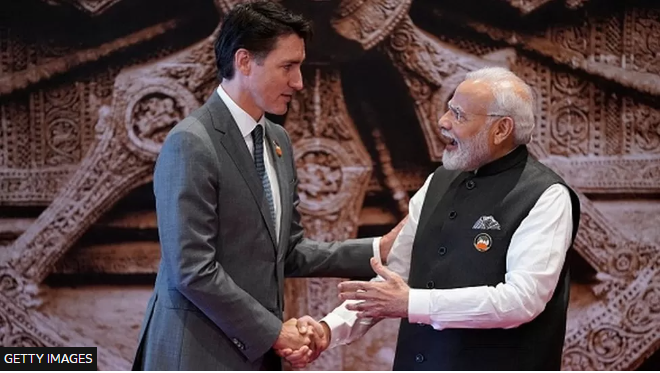India has suspended visa services for Canadian citizens amid an escalating row over the killing of a Sikh separatist on Canadian soil.
Visa service provider BLS posted a message from India's mission blaming "operational reasons" for the decision.
Tensions flared this week after Canada said it was investigating "credible allegations" linking India with the murder of the separatist leader.
India angrily rejected the allegation calling it "absurd".
Analysts say relations between the countries, which have been strained for months, are now at an all-time low.
The message about the suspension of visas was first posted on the BLS website on Thursday.
"Important notice from Indian Mission: Due to operational reasons, with effect from 21 September 2023, Indian visa services have been suspended till further notice," it read.
India's foreign ministry refused to comment on the matter and asked the BBC to refer to the BLS website.
The move comes a day after India issued an advisory urging its citizens travelling to or living in Canada to "exercise utmost caution" in view of the "growing anti-India activities and politically-condoned hate crimes and criminal violence in Canada".
Delhi said that some recent threats were directed at its diplomats and some Indians "who oppose the anti-India agenda".
Canadian Prime Minister Justin Trudeau said on Monday that intelligence agencies were investigating whether "agents of the government of India" were involved in the killing of Hardeep Singh Nijjar, a Canadian citizen - India had designated him a terrorist in 2020.
Nijjar was shot dead in his vehicle by two masked gunmen outside a Sikh temple on 18 June in British Columbia.
"Any involvement of a foreign government in the killing of a Canadian citizen on Canadian soil is an unacceptable violation of our sovereignty," Mr Trudeau told the Canadian parliament on Monday.
India reacted strongly, saying that Canada was trying to "shift the focus from Khalistani terrorists and extremists" who had been given shelter there.
The Indian government has often reacted sharply to demands by Sikh separatists in Western countries for Khalistan, or a separate Sikh homeland.
The Khalistan movement peaked in India in the 1980s with a violent insurgency centred in Sikh-majority Punjab state.
It was quelled by force and has little resonance in India now, but is still popular among some in the Sikh diaspora in countries such as Canada, Australia and the UK.
Canada has the highest number of Sikhs outside Punjab and has seen several pro-Khalistan protests and demonstrations.
In June, reports said India had raised a "formal complaint" with Canada about the safety of its diplomats there.
Latest Stories
-
Baltasar Coin becomes first Ghanaian meme coin to hit DEX Screener at $100K market cap
22 minutes -
EC blames re-collation of disputed results on widespread lawlessness by party supporters
37 minutes -
Top 20 Ghanaian songs released in 2024
58 minutes -
Beating Messi’s Inter Miami to MLS Cup feels amazing – Joseph Paintsil
1 hour -
NDC administration will reverse all ‘last-minute’ gov’t employee promotions – Asiedu Nketiah
1 hour -
Kudus sights ‘authority and kingship’ for elephant stool celebration
1 hour -
We’ll embrace cutting-edge technologies to address emerging healthcare needs – Prof. Antwi-Kusi
2 hours -
Nana Aba Anamoah, Cwesi Oteng special guests for Philip Nai and Friends’ charity event
2 hours -
Environmental protection officers receive training on how to tackle climate change
2 hours -
CLOGSAG vows to resist partisan appointments in Civil, Local Government Service
3 hours -
Peasant Farmers Association welcomes Mahama’s move to rename Agric Ministry
3 hours -
NDC grateful to chiefs, people of Bono Region -Asiedu Nketia
3 hours -
Ban on smoking in public: FDA engages food service establishments on compliance
3 hours -
Mahama’s administration to consider opening Ghana’s Mission in Budapest
3 hours -
GEPA commits to building robust systems that empower MSMEs
3 hours

